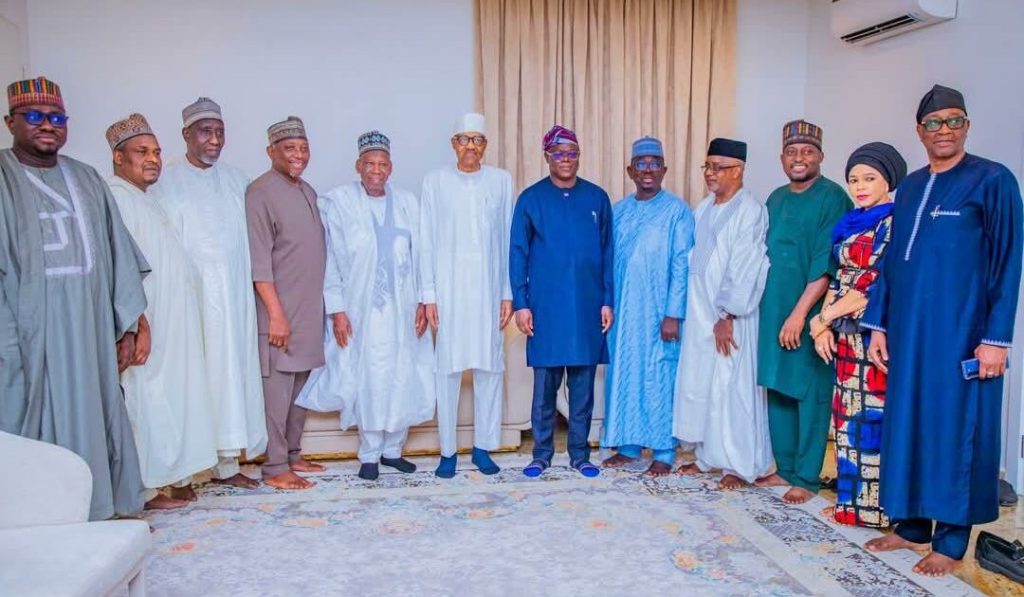Paragraph 1: Sallah Homages and Political Undercurrents
Against the backdrop of recent political realignments and simmering tensions within Nigeria’s political landscape, former President Muhammadu Buhari received two separate delegations at his Kaduna residence on Friday. First, the 2023 presidential candidate of the opposition Peoples Democratic Party (PDP), Atiku Abubakar, led a group that included prominent figures such as former governors and ministers on a Sallah homage to the former president. This visit, steeped in traditional courtesy, also carried subtle political undertones, considering the ongoing legal challenges to the presidential election results. Hours later, a delegation from the ruling All Progressives Congress (APC), led by its National Chairman, Abdullahi Ganduje, also paid a visit to Buhari. The convergence of these two visits on the same day fueled speculation and underscored the political dynamics at play.
Paragraph 2: The APC’s Visit and Internal Dynamics
The APC delegation’s visit to Buhari, a founding member of the Congress for Progressive Change (CPC) faction of the party, came at a time of internal party maneuvering and potential fracturing. Recent defections of some APC members to the Social Democratic Party (SDP) have raised concerns about the stability of the ruling party, particularly regarding the loyalty of the CPC bloc. While the exact agenda of the APC’s visit remains undisclosed, the timing suggested an attempt to reassure Buhari of the party’s unity and commitment to his legacy. The presence of influential figures like former Kaduna State Governor Nasir el-Rufai, former Sokoto Governor Aminu Tambuwal, and former ministers Abubakar Malami and Isa Pantami further emphasized the significance of the meeting.
Paragraph 3: Downplaying Political Significance
Following the meeting, Nasir el-Rufai addressed reporters, downplaying the political implications of the visit. He characterized it as a gesture of "unity and brotherhood," urging "adversaries" not to overinterpret the event. This deliberate attempt to depoliticize the visit, however, did little to quell the swirling rumors and speculation surrounding the APC’s internal dynamics. The timing, so close to the PDP’s visit, and the context of internal party anxieties suggested a deeper political motivation beyond the stated purpose.
Paragraph 4: Buhari’s Loyalty and the CPC Bloc
The visit to Buhari held particular weight due to his historical association with the CPC, one of the four parties that merged to form the APC. The recent defections to the SDP sparked concerns about the potential exodus of other CPC members, jeopardizing the ruling party’s cohesion. Securing Buhari’s continued allegiance to the APC was crucial for maintaining stability and projecting a united front. Buhari’s earlier affirmations of his unwavering commitment to the APC served as a reassuring message, but the party leadership likely sought to reinforce this commitment and address any lingering doubts or anxieties during the visit.
Paragraph 5: Political Maneuvering and Future Implications
Both the PDP and APC visits to Buhari underscored the ongoing political jostling and attempts to secure alliances and influence. The PDP, still contesting the presidential election results, may have sought to gain Buhari’s implicit acknowledgment or, at the very least, neutrality in the legal proceedings. Meanwhile, the APC, facing internal pressures, aimed to consolidate its base and prevent further fragmentation. The visits, occurring within hours of each other, highlighted the fluidity of political allegiances and the strategic maneuvering characteristic of Nigerian politics.
Paragraph 6: Beyond the Sallah Greetings
While presented as Sallah homage, the visits transcended mere seasonal greetings. They represented a complex interplay of political maneuvering, strategic positioning, and efforts to manage internal party dynamics. The APC, grappling with potential fracturing, sought to secure Buhari’s unwavering loyalty, while the PDP aimed to potentially neutralize a powerful figure in the ongoing election dispute. These visits, therefore, offered a glimpse into the behind-the-scenes power plays unfolding within Nigerian politics, underscoring the significance of personal relationships and strategic alliances in navigating the country’s complex political landscape. The true implications of these meetings will likely unfold in the coming weeks and months, as political alignments shift and the post-election landscape takes shape.














